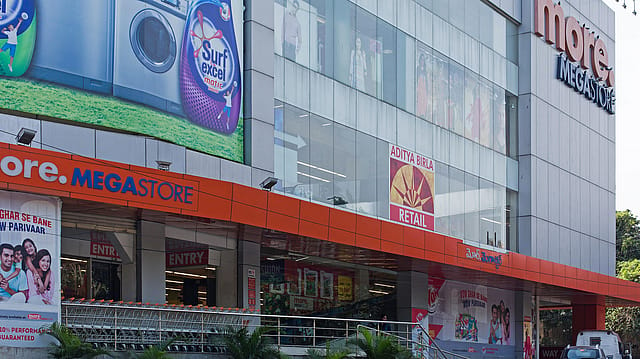Samara Capital, Amazon buy Aditya Birla Group’s retail chain More: report
ADVERTISEMENT

Amazon has struck an agreement, in partnership with private equity firm Samara Capital, with Aditya Birla Group to acquire the diversified Indian business house's food and grocery retail chain, More, media reports said on Wednesday.
India-focussed private equity firm Samara Capital and Amazon will acquire More, which operates a chain of around 575 stores across India at a valuation of around ₹4,200 crore, according to a report by business daily The Economic Times (ET).
The development was confirmed by RKN Retail Pvt Ltd, a firm owned by the Aditya Birla Group and the promoter firm of Aditya Birla Retail Ltd (ABRL). ABRL operates More chain of multi-brand retail outlets.
According to the filing, Samara Capital, through its Witzig Advisory Services will acquire 62.19% stake in ABRL. The filing also added that Kanishtha Finance and Investment Ltd has also sold its 37.81% stake but it did not confirm whether the sale was to Amazon.com Inc and neither has the American firm confirmed the development yet.
While the acquisition of More is subject to regulatory clearances including one from the Competition Commission of India (CCI), the deal is already seen by experts as one of the landmark transactions in the retail space.
A few years ago when e-commerce giants Flipkart, Snapdeal and Amazon India first became the talk of town, a general sense prevailed that online commerce would sound the death knell for brick-and-mortar retail.
While a player like Snapdeal lost its mojo along the way and became an also-ran entity, others like Flipkart and Amazon – with their technological backbone and deep pockets funded by global investors – have clearly grown in size and scale. Yet, online retail companies are interested in either acquiring or partnering with traditional retail chains more than ever before. Not only that, some of them have, or are looking to have their own physical touch-points as well.
If the transaction were to materialise, this would be Amazon’s second investment in brick-and-mortar retail in India. In September 2017, Amazon had acquired a 5% stake in Shopper Stop for ₹179 crore. The strategic investment gave the Indian arm of the US-based global e-commerce company a physical platform to showcase itself, as well as access to a catalogue of Shoppers Stop’s in-house apparel brands.
“Acquisitions like these will help digital firms to scale up omni-channel presence and online trade,” said Kaustubh Pawaskar, Senior Research Analyst - FMCG and Consumer Discretionary, Sharekhan. “While the scope of growth in the sector is good as consumers are increasingly focussing on organic and healthy products and there are few players in the segment, it is a capital intensive business,” he added.
“This acquisition is effectively in line with the way online players are trying to have an offline footfall in the Indian market. Retailers and e-tailers are betting big on the grocery space, which accounts for a majority sales in general/Kirana trade in India and identifying potential synergies in backend operations, on-time delivery and supply chain management to offer unique and good quality products as a key to success,” said Rajat Wahi, partner, Deloitte Consulting.
According to retail industry expert and consultant Arvind K. Singhal, chairman and managing director of Technopak, the deal will give the e-commerce giant a platform to gauge consumer demand in the offline space, sell its own private label products offline and attract customers to the online store. Amazon.com sells a wide range of products from electronic items to accessories under the AmazonBasics brand.
However, Singhal says that the investment might not have visible impact over the next year or 18 months. “It is a strategic investment for Amazon...For Amazon, it cannot hold inventories in India due to stringent government policies,” he added.
As companies seek to play a bigger role in an emerging market as large as India, M&A activities and strategic partnerships are expected to witness an increase in this space.
As Harsha Razdan, partner and head - consumer markets at KPMG in India says: “Recent government initiatives coupled with increased disposable incomes are forcing large global players to consider increasing their footprint in a rapidly growing economy like India.”